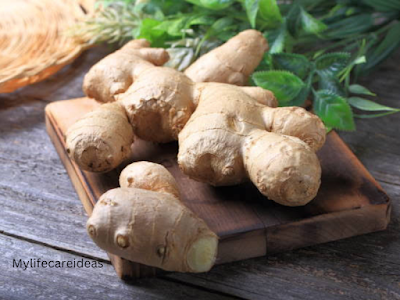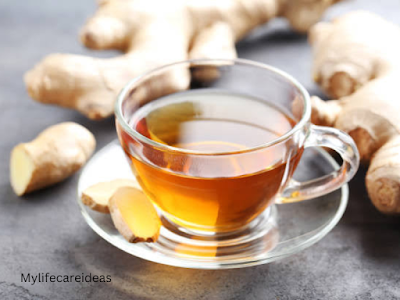Ginger not only gives meals a great flavor,
but it is also high in nutrients. The root has been used by humans for
thousands of years in both cooking and medicine.
Ancient medical texts from Rome, Greece,
China, and the Arab world all discuss the benefits of ginger. In Asian
medicine, it was particularly well-liked as a remedy for digestive problems
like nausea and diarrhea. Ginger is also traditionally used to treat burns,
stomach pain, menstrual cramps, cold and flu symptoms, and muscular and joint
pain.
Today, ginger is still regarded as a natural
remedy for soothing an upset stomach, and research supports its health
advantages. Numerous contemporary recipes also incorporate ginger.
What is Ginger?
Ginger is a tropical blossoming plant that has
its origins in Southeast Asia and is now widely available from farmers all over
the world. It is closely linked to turmeric because it is part of the "Zingiberaceae"
family. The scientific term for ginger, "Zingiber officinale" is
thought to have come from the Sanskrit word for the spice (singabera).
Health Benefits Of Ginger
Ginger may be antiviral, antibacterial, and
anti-inflammatory. Here are a few possible medical applications for ginger.
Here are 10 health benefits of ginger are listed below.
1- Supports The Immune System:
Many people take ginger to hasten their
recovery from the cold or the flu. The majority of the data, nevertheless, is
anecdotal.
Researchers looked at how one respiratory
virus reacted to fresh and dried ginger in human cells. According to the
results, dried ginger may help to protect the respiratory system even if it did
not have the same impact as fresh ginger.
According to one study, eating ginger
regularly may help the immune system. This may aid in the treatment of other
ailments like the flu or the common cold as well as chronic disease prevention.
2- Reduces Cancer Risk:
The root could be an effective tool in the war
against cancer. The main ingredient in ginger, gingerol, has been shown to have
anti-cancer properties by researchers. In particular, it could be beneficial
for the treatment and prevention of gastrointestinal malignancies.
Its strong antioxidant concentration is probably
to blame for inhibiting the proliferation of cancer cells. Ginger's
antioxidants may even aid to slow down the effects of aging.
3- Lowers Blood Sugar Levels:
Your blood sugar levels may be improved and
your risk of acquiring type 2 diabetes may be reduced by including ginger in
your diet.
Researchers showed that those who took 1,600
mg of ginger powder for 12 weeks had greater insulin sensitivity, reduced
triglycerides, and lower total cholesterol when compared to the control group
in one trial on people with type 2 diabetes.
4- Relieves Period Pain:
According to studies on ginger's
pain-relieving properties, it is very good at easing menstrual pain. Ginger tea
might make you feel better around that time of the month. However, if you
frequently take acetaminophen or ibuprofen, it might not work as well for you.
Speak with your doctor first before
contemplating any supplement, whether it be an extract or a pill, as it might
mix with other medications you're taking.
5- Anti - Inflammatory Properties:
Ginger contains phytonutrients, which are
similar to antioxidants and may lessen cell damage. These nutrients are found
in a variety of foods, including fruits and vegetables, nuts, seeds, beans, and
whole grains.
The core cause of inflammation can also be
eliminated by reducing cell signaling activity. Given this, adding ginger to
meals that are already nutritious and healthy is the key to releasing those
qualities.
6- Weight Loss Ginger Benefits:
In several limited trials, ginger has been
linked to some benefits for weight loss when combined with other plant
extracts.
But like everything else, ginger is not a
magic weight-loss solution! For people to lose weight and keep it off, other
elements of a good, nutritious diet are just as important.
7- Reducing Gas & Improves Digestion:
Numerous studies have looked into how ginger affects the development of intestinal gas during digestion. According to this study, the enzymes in ginger can aid in dissolving and expelling this gas, thereby easing any discomfort.
Furthermore, research indicates that ginger may increase gastrointestinal motility, which may help to relieve or avoid constipation.
Pancreatic lipase is an enzyme that aids in digestion in the small intestine, and ginger appears to have beneficial effects on it.
8- Relieving Nausea:
According to one study, ginger may help with
nausea brought on by cancer treatment and morning sickness.
Researchers claim that the odor-producing
compounds gingerols and shogaols can stop nausea and vomiting in their tracks. However,
the amounts of different compounds can vary based on the variety of ginger.
The researchers discovered that dried ginger
had the highest concentrations of gingerol, followed by fresh ginger and powder
from ginger tea.
9- Powerful Medicinal Properties:
Ginger's distinctive flavor and aroma come
from its natural oils, of which gingerol is the most significant.
The primary bioactive ingredient in ginger is
gingerol. It is primarily to blame for ginger's medicinal properties.
Gingerol has potent anti-inflammatory and
antioxidant capabilities, according to research. In addition, it might help
reduce oxidative stress, which the body experiences when there are too many
free radicals in the body.
10- Improves Brain Function:
Oxidative stress and chronic inflammation both
speed up aging. They are believed to be one of the main factors contributing to
cognitive deterioration and Alzheimer's disease.
There is some proof that ginger can directly
improve brain function. Daily doses of the ginger extract were found to
increase working memory and reaction time in one research of healthy
middle-aged women.
Drinking Of Ginger Tea Benefits:
"In the winter, ginger tea is
wonderful,". It tastes great after dinner. Mixing in a little honey, lemon, or lime may prepare a delicious beverage.
Many grocery stores sell commercial ginger tea
bags that contain dry ginger, often in conjunction with additional ingredients.
These tea bags are easy to use and keep their flavor well. Dried ginger
provides potent health advantages on par with those of fresh ginger, albeit
dried ginger tea may taste milder.
Fresh ginger requires more preparation
but tends to provide a more potent, lively brew when used to make ginger root
tea.
How To Make Ginger Tea:
- Purchase some fresh ginger.
- Cut out the dry ends and difficult knots.
- Peel it slowly.
- Slice it thinly across the grain.
- A cup or mug should include a handful of the slices.
- Cover after adding boiling water.
- It advises letting the slices steep for at least 10 minutes to extract the full benefits of the ginger. The more time, the better.
It points out that ginger tea is a more
beneficial substitute for ginger beer, ginger ale, and other canned or bottled
commercial ginger beverages. It advises reserving these for special occasions
or selecting sugar-free alternatives because "these drinks deliver the
advantages of ginger, but may include a lot of sugar."
Must read about: 7 Homemade Herbal Tea Recipes To Boost Your Immunity





.jpg)

0 Comments